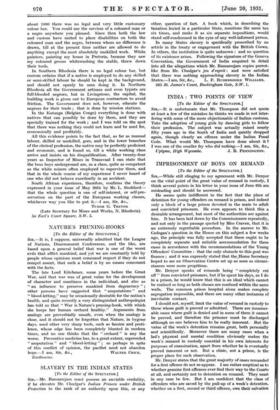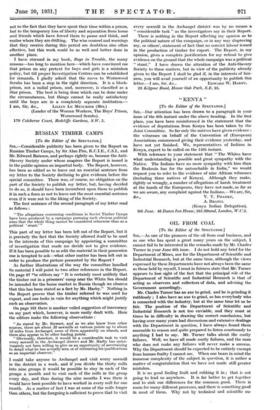IMPRISONMENT OF BOYS ON REMAND
[To the Editor of the SPEcrieroa.1 Sra,—While still clinging to my agreement with Mr. Denyer on the vital point of the great value of remand in custody, I think several points in his letter in your issue of June 6th are misleading and should be answered.
He seems quite indifferent to the fact that the place of detention for young offenders on remand is prison, and indeed only a block of a large prison devoted in the main to adult and convicted prisoners. He even appears to think this a desirable arrangement, but most of the authorities are against him. It has been laid down by the Commissioners repeatedly, and not only in the passage quoted by Miss Craven, that it is an extremely regrettable procedure. In the answer to Mr. Cadogan's question in the House on this subject a few weeks ago, the principle was fully accepted that there ought to be completely separate and suitable accommodation for these cases in accordance with the recommendations of the Young Offenders' Committee : that the only obstacle to this goal was finance ; and it was expressly stated that the_Home Secretary hoped to see an Observation Centre set up as soon as circum- stances were more propitious.
Mr. Denyer speaks of remands being " completely cut off " from convicted prisoners, but if he spent his days, as I do in a prison, he would know that this is an ideal which cannot be realised so long as both classes are confined within the same walls. The common prison hospital alone makes complete segregation impossible, and there are many other instances of inevitable contact.
I should not, myself, limit the value of remand in custody to those whose guilt is proved or admitted. There are innumer- able cases where guilt is denied and in some of them it cannot be proved, and therefore the prisoner must be discharged although no one believes him to be really innocent. But the value of the week's detention remains great, both personally and scientifically. Moreover there are many cases when a lad's physical and mental condition obviously makes the week's remand in custody essential in his own interests for purposes of examination, apart from whether he is eventually proved innocent or not. But a clinic, not a prison, is the proper place for such observation.
Mr. Denyer states that the great majority of cases remanded for a first offence do not re-appear. I am rather sceptical as to whether genuine first offences ever find their way to the Courts at all, and certainly not to detention on remand. They must in any case be few. But I am confident that the class of offenders who are saved by the pull-up of a week's detention, whether on a first, second or third offence, owe their salvation not to the fact that they have spent their time within a prison, but to the temporary loss of liberty and separation from home and friends which have forced them to pause and think, and -realise where they are drifting. The wise counsel and warnings that they receive during this period are doubtless also often effective, but this work could be as well and better done in another place.
I have stressed in my book, Boys in Trouble, the many reasons—too long to mention here—which have convinced me that prison on any pretext for boys and girls is a mistaken policy, but till proper Investigation Centres can be established for remands, I gladly admit that the move to Wormwood Scrubs has been a step in the right direction. It is a block- prison, not a 'radial prison, and, moreover, is classified as a Star prison. The best is being done which can be done under the circumstances, but things cannot be really satisfactory until the boys are in a completely separate institution.—
I am, Sir, &c., LILIAN LE MESLTRIER (Mrs.)
(Leader of the Women Workers, The Boys' Prison, Wormwood Scrubs): 170 Coleherne Court, Redclijfe Gardens, S.W. 5. "











































 Previous page
Previous page